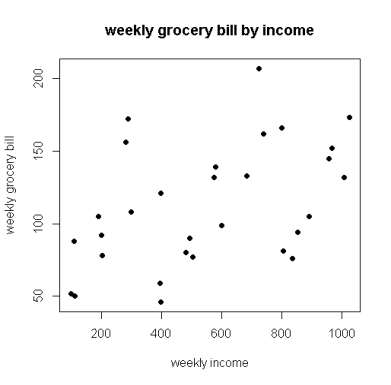An economist conducted a study of the possible association between weekly income and weekly grocery expenditures. Of particular interest was whether higher income would result in shoppers spending more on groceries. A random sample of shoppers at a local supermarket was obtained. A questionnaire was administered asking about the weekly income of each shopper's family and their grocery bill for that week.  The scatterplot of weekly grocery expenditures vs. income shows:
The scatterplot of weekly grocery expenditures vs. income shows:
Definitions:
Discrete Probability
The mathematical study of probability where the outcome is determined from a set of distinct, separate values.
Queuing Theory
A body of knowledge about waiting lines.
Little's Law
A principle in queuing theory stating that the long-term average number of customers in a stable system L is equal to the long-term average effective arrival rate, λ, multiplied by the average time a customer spends in the system, W (L = λW).
Poisson Distribution
The Poisson Distribution is a statistical distribution that expresses the probability of a given number of events occurring in a fixed interval of time or space if these events occur with a known constant mean rate and independently of the time since the last event.
Q2: A survey of radio stations was conducted
Q12: Brown CA was auditing her client Red
Q12: The Kruskal-Wallis test is best described as:<br>A)a
Q19: A survey of 10 students was conducted
Q25: Which of the following is false?<br>A)As the
Q27: According to the M&Ms Web site, each
Q36: The accounting department at Blue Manufacturing Limited
Q36: Consumers' Union measured the gas mileage per
Q38: Student ages (to the nearest year) in
Q40: An administrator in charge of residential life